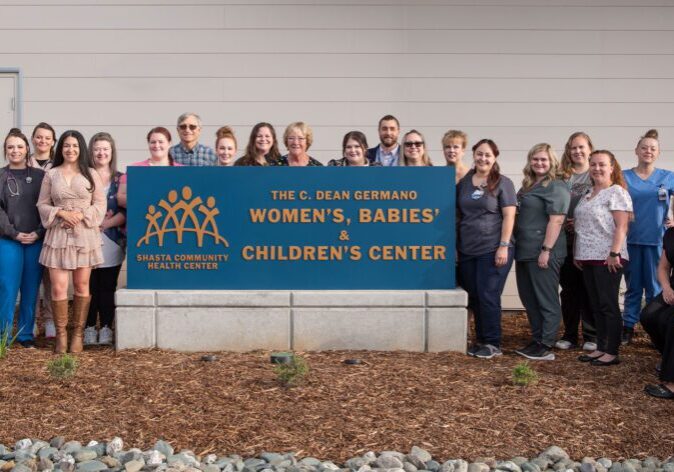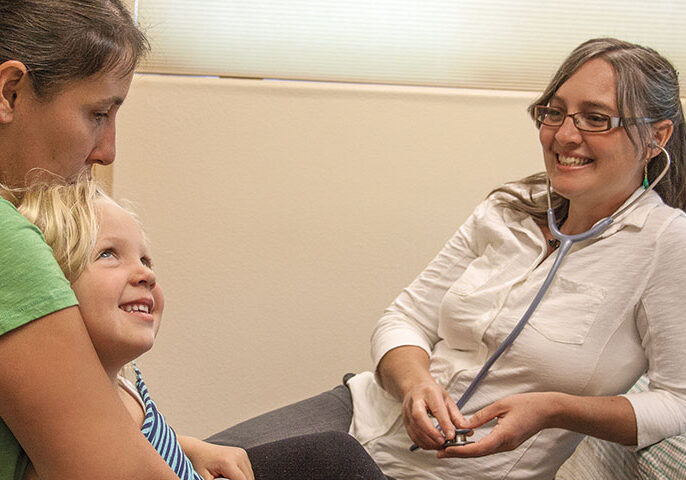The Fourth Trimester – How a Postpartum Doula Can Help
As a Siskiyou County licensed midwife, Sue Wolcott has helped many women bring their babies into the world, and she understands firsthand the importance of good support during the fourth trimester—the three months following the birth of a baby. Referring to this period, Sue notes, “It’s a life-changing time of real transition. Moms are tired, healing, establishing breastfeeding, and often unsure of how to take care of themselves, this new person, and the rest of their family. A postpartum doula can be a good source of support and security during this window.”
What is a postpartum doula?
The first 6-12 weeks after a newborn arrives can be a mixture of happiness and anxiety as moms settle into a new routine. Many of today’s new mothers lack the support network that mothers have relied upon for generations. Close family and friends are far-flung, and partners return to work within days. A postpartum doula can provide experience and valuable support that a new mother may be missing.
Rose Spagnola is a doula in Siskiyou County who agrees. “In our culture, women get this pressure that we need to be so strong and take care of everything totally by ourselves. Mothers are feeling isolated and alone because we’ve lost track of the fact that this is community work.” Rose continues, “It’s so different for each person, even if you have multiple children, the entire environment changes, and there’s no balance there. Having that helping hand and extra support, both emotionally and around the house, makes it so much easier.”
In addition to support and some basic household help, postpartum doulas are trained to help parents with information on things like breastfeeding, emotional and physical healing, mother-baby bonding, and basic newborn care.
Rose notes that while a mom is healing, especially from a difficult or surgical birth, a doula can help with many of the things the mom would normally do herself. The doula can also do this as a non-biased neutral party with services designed for each family and their unique needs.
Mothering the mother
A mom who spends hours alone with her baby can spiral into emotional and physical exhaustion, which can put her at greater risk for postpartum anxiety or depression. During this challenging transition period, a postpartum doula provides calm reassurance and support to a new mother and her family.
“When moms feel supported at home, and they are getting what they need, the rates of postpartum depression are reduced,” says Kate Kripke, LCSW, an expert in perinatal mood and anxiety disorders. “There is a lot to be said about the role the postpartum doula plays in simply mothering the mother after she gives birth that can be incredibly preventative for lots of women.”
Kate continues, “When doulas are educated in what to look for, they’re one of the first people to pick up on and identify when something is going on with the mom.”.
To help women and their families recognize the signs of postpartum depression and anxiety, the Mothers Strong collaborative in Butte County offers online and in-person connections to support and education. This collaborative of new mothers, families, and agencies works together to support mothers, help them identify when they need help, and guide them to critical resources. That includes support groups and therapists with specialized training for working effectively with women and families experiencing postpartum depression or anxiety. Mothers Strong also offers women an online gathering place with the Mothers Strong Café on Facebook, a group created as a safe place to interact and share mom-to-mom peer support. The general Mothers Strong Facebook page focuses on motherhood wellness, sharing information about local support events, resources, and articles.
Anna Bauer is the Director of First 5 Butte County, a dedicated Mothers Strong partner. In the Mothers Strong Building Strong Families video Anna says, “While it’s wonderful that many mothers do not experience perinatal mood and anxiety, it’s critical that we understand that 15-20% of new mothers do experience it and they do need help and there is help available for them.”
What is postpartum depression?
According to Postpartum Support International, postpartum depression is the most common complication of childbirth, and one in eight women will suffer from it. Symptoms include insomnia, severe mood swings, a lack of joy, loss of appetite, overwhelming fatigue, withdrawal from family and friends, and thoughts of suicide. Postpartum depression can also interfere with healthy bonding between a mom and her newborn.
“When a baby is on the inside, a woman takes amazing care of herself. And then the baby is born, and it becomes all about the baby. As soon as that mom starts to struggle and suffer, she will no longer have what is required to care for her baby the way she wants to. Not because she isn’t a good mom or doesn’t love her child, but simply because she’s human,” Kate explains. “I find that the women who are enjoying motherhood the most and who feel the healthiest are the ones who are receiving help.”
How you can help
Having a sense of community is vital to a new mom’s health and well-being. Here are ways you can help a new mom during those first few weeks home but always text or call ahead first.
- Coordinate an online care train (mealtrain.com) where friends and family can sign up for time slots to deliver meals, take care of siblings, clean house or rock the baby.
- Offer to rock the baby for a couple of hours to give mom a chance to take a shower or a nap.
- Deliver a healthy snack.
- Drop off a fully prepared meal.
- Babysit any older children for an afternoon.
- Offer to walk the dog, clean house, or run an errand.
- Give her a gift card to her favorite take-out restaurant.
Posted in: Birth and Toddlers, Health & Nutrition
Comment Policy: All viewpoints are welcome, but comments should remain relevant. Personal attacks, profanity, and aggressive behavior are not allowed. No spam, advertising, or promoting of products/services. Please, only use your real name and limit the amount of links submitted in your comment.
You Might Also Like...

Shasta Community Health Center Brings Advanced and Compassionate Care to Northern California Families
The new C. Dean Germano Women’s, Babies’ & Children’s Center at Shasta Community Health Center in Redding offers support for low-income families and mothers braving high-risk pregnancies and provides health […]

How Parents Can Make Use of Natural Medicine
When I was growing up, no one emphasized natural medicine as a viable health care choice. Instead I was brought up, as I imagine you were, to rely entirely on […]

How Do I Get My Toddler to Stop Hitting?
Toddlers are little people with big feelings. Sometimes, the only way for those big feelings to come out is through their actions: hitting, kicking, biting, flopping, screaming. It’s not because […]

Osteoporosis is Not Inevitable – Early Prevention is the Key
Did you know that the current statistic is that 50 percent of women in the U.S. age 50 or older will break a bone due to osteoporosis? But that statistic […]




